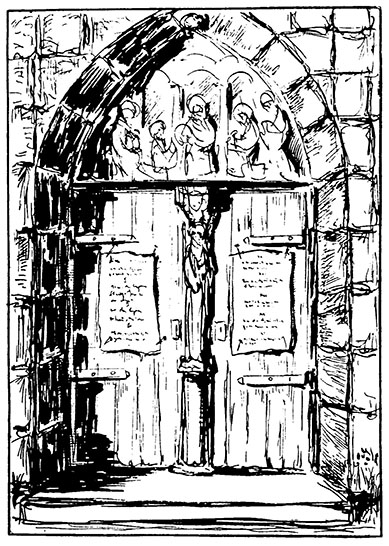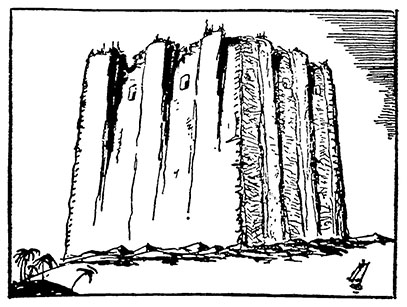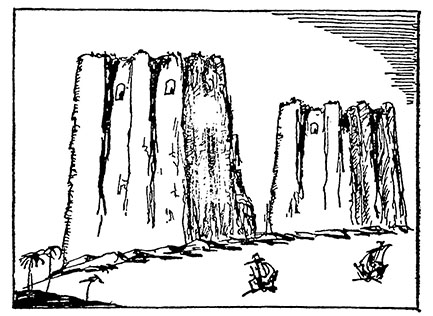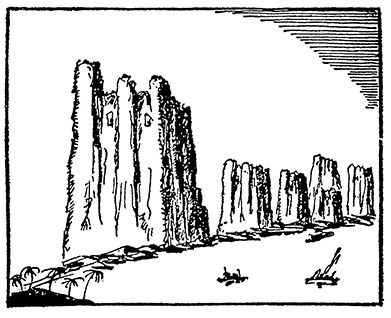Chapter 13 12. The Christian Reformation Movement
One of the few useful things modern psychology has taught us is that we rarely do things with a single motive.Whether we donate a million dollars to a new university, or give a penny to a hungry bum, whether we declare that a life of true intellectual freedom can only be found abroad, or vow never to leave America again Whether the coast insists on calling black white or white black, there are always various motives driving our decisions, and we know it in our hearts.But if we dared to admit it honestly to ourselves and to those around us, it would be a pitiful public image for us.It is in our nature to select the most admirable and valuable of our various motives, embellish it to suit public taste, and present it to the world as "the real reason why we do something." ".
But although this can deceive everyone in most situations, there is never a way to deceive oneself, even for a minute.
This embarrassing truth is well known to all, for it has been cunningly agreed since the dawn of civilization not to be exposed in any public place.
What we think in our hearts is our own business.As long as you maintain a sanctimonious appearance on the outside, you will feel satisfied in your heart, so you are happy to abide by the principle: "If you believe my lies, I will believe yours."
Nature knows no bounds of decorum, is such a great exception to our general rules of conduct, that she is seldom admitted to pass through the sacred gates of civilized society.Since history has hitherto been the pastime of the few, the poor goddess named Cleo has hitherto led a dreary life, especially compared with her less respectable sisters.Her sisters had been allowed to sing and dance freely since the beginning of the world, and had been invited to every evening party, which of course aroused the great resentment of poor Cleo, who sought her vengeance with subtle arts.
Retaliation is purely human, yet dangerous, and often demands a high price in human life and property.
Whenever this old woman reveals to us a set of lies passed down through the centuries, the whole peaceful and happy world is thrown into turmoil, and a thousand battlefields surround the world.Cavalry regiments began to rampage, and groups of infantry all over the hills slowly crawled across the earth.Afterwards, all the people returned to their homes or cemeteries, and the whole country was desolate, and countless gold and silver were dried up to the last penny.
As stated, our colleagues are now beginning to see that history is as much an art as a science, governed by unspoken laws of nature hitherto respected only in chemical laboratories and observatories.So we have a very useful scientific cleaning, which will benefit future generations.
Which finally brings me to the title I opened this chapter with: the Christian Reformation.
Until not long ago, there were only two views on this great social and ideological change, one was to fully affirm it, and the other was to completely deny it.
The proponents of the former view believe that it was a sudden outburst of religious enthusiasm. Some noble theologians were shocked by the filthy rule and bribery of the Pope, and established their own independent churches to express their sincere desire to be true Christians. people who teach the true faith.
Those who remained loyal to Rome were by no means so enthusiastic.
According to the scholars on the other side of the Alps, the Reformation was an abominable and abominable rebellion. A few despicable royal nobles did not want to get married and wanted to get the property that should belong to the Holy Mother of the Church, so they conspired to make trouble.
As always, both sides are right and both are wrong.
The Reformation was brought about by all kinds of people for all kinds of motives.Only recently have we begun to understand that religious discontent was only a secondary cause of the great upheaval, that it was in fact an inevitable social and economic revolution with little theological background.
It would certainly be better to teach our children and grandchildren that Prince Philip was an enlightened ruler interested in reformed teachings than to show children how a shameless politician, through cunning, is trying to convince other Christians It was much easier to accept the help of the pagan Turks when the war started.Thus, for centuries, Protestants have cast an ambitious young earl as a hero of generosity, hoping to get the Hessians to replace the ancient enemies of the Habsburgs.
Bishop Clement, on the other hand, may be compared to the lovable shepherd who spends his last waning energies in vain protecting his flock from being led astray by false leaders, than to describe him as a The typical Medici prince is easier to understand, because the Medici family saw the Reformation as a disgraceful row of drunken German monks and used the power of the church to promote the interests of the Italian motherland.So we should not be surprised if we see this fabled figure smiling at us in Catholic textbooks.
Such a history may be necessary in Europe, but now that we are fortunate enough to settle in the New World, we need not insist on the mistakes of our Continental ancestors, but should be free to draw our own conclusions.
Philip of Hesse was a close friend and supporter of Luther. Although he had strong political ambitions, he could not be said to be impious in religious belief.
He was nothing like that.
When he signed the famous Protest in 1529, he and the other signers knew that they would be "severely stricken by a violent tempest" and die on the scaffold.He could not have played the part that he actually played if he had not possessed extraordinary courage.
What I am trying to say, though, is that historical figures are inspired to do things and forced to forego things, but without a deep understanding of his various motives, it is advisable to make judgments about him (or about people we are familiar with). Difficult, or even impossible.

protest
There is a French proverb: "To know all is to forgive all." This solution seems too simplistic.I would like to add a little, and amend it to read: "To know all is to understand all." The good Lord has reserved to himself the power of forgiveness centuries ago, and let him do it.
We can keep it low and try to "understand", which is more than enough for the limited human ability.
Now I return to the Reformation, a subject which has caused me to diverge a little.
As far as I "understand", this movement was at first the expression of a new spirit, the result of the economic and political developments of the previous three centuries, which came to be known as "nationalism", and so it was different from that foreign country. China is a sworn enemy.The European countries in the first five centuries were forced to act according to the eyes of the country on a country.
The Germans, the Finns, the Danes, the Swedes, the French, the English, and the Norwegians could not have been united into a force strong enough to tear down the prison walls that had long imprisoned them, without a common enemy.
Neither would the Reformation have succeeded had their sinister jealousies not been tempered for a moment by a great ideal, and set free from personal animosities and ambitions.
On the contrary, the Reformation would have been reduced to a series of small local uprisings, which could easily be suppressed by a corps of mercenaries and a few vigorous inquisitors.
The leader of the Reformation would be subject to the fate of Huss, and his followers would be put to death like the Waldenites and Albigerians who had been slain before.The Pope's ruling circle would record yet another easy victory, followed by a Schleck-like rule of the 'disciplined'.
Although the reform movement was victorious, the scope of its success was extremely small.As soon as the victory was won, and the threat to the existence of the rebels removed, the Protestant camp disintegrated into a thousand hostile hills, repeating, within a much reduced area, all the mistakes of the enemy's reign.
A French bishop (I'm sorry I forgot his name, but he was a very clever man) once said that we must love human beings, no matter what their circumstances are.
Looking back from the outsider's point of view, nearly four centuries have been filled with hope, but also with greater despair.How many men and women have with noble courage laid down their lives on the guillotine and on the battlefield for an ideal that has never been realized.We also look at the millions of obscure burghers who sacrificed for something they believed to be sacred; and the Protestant revolt, which failed miserably in their attempts to build a freer and more enlightened world .This will put people's fraternity to an extremely severe test.
To put it bluntly, the Protestantism takes away from the world much that is good, noble, and beautiful, and adds much that is narrow, hateful, and crude.It does not make human society simpler and more harmonious, but makes it more complex and disorderly.However, this is not so much the fault of the Reformation as the inherent weakness of the majority.
They don't want to rush into it.
They simply cannot keep up with the leaders.
They have no shortage of good intentions, and eventually they will cross the flyover to the new world.But they have to choose the best time, and they still refuse to give up the tradition left by their ancestors.
The Reformation, which wanted to establish an entirely new relationship between Christians and God, rid of all the prejudices and corruptions of the past, was so utterly confused by the medieval baggage in the minds of its followers that it could neither move forward nor Unable to back down, it quickly developed into a movement indistinguishable from the papal organization it abhorred.
Such is the tragedy of the Protestant revolt, which cannot be escaped from the mediocrity of the minds of the majority of its supporters.
As a result, those in the west and north did not make as much progress as might be expected.
The Reformation failed to produce a so-called infallible man, but produced a book, said to be flawless.
Instead of a supreme authority, there have been countless small authorities, each of whom wants to be a leader within its own sphere.
It does not divide the Christian world into two parts, one half is dominant.Half non-dominant, half religious, half heretics, created countless dissenting cliques, having nothing in common with each other, and hating everyone who disagreed with them.
Instead of establishing a tolerant unity, it imitated the early church. Once it gained power, relying on countless religious manuals, teachings, and confessions to build a solid line of defense, it declared war openly and ruthlessly attacked those who did not agree with their societies. official doctrine.

Almighty Prison
This is undoubtedly too regrettable.
But in the development of thought in the sixteenth and seventeenth centuries, this was unavoidable.
To describe the courage of leaders like Luther and Calvin, there is only one word, and it is quite scary: colossal.
One of the professors at the Tide College in the barrens of the German outskirts, a simple Dominican monk, blatantly burned a papal bull and knocked hard on the door of the church with his own rebellious ideas.And the sickly Frenchman, who turned a small Swiss village into a fortress, without regard for the Pope's power.These are examples of human fortitude that are unmatched in the modern world.
These daring rebels quickly found friends and supporters, but these friends had their own goals, and the supporters were just trying to make money in troubled waters. Fortunately, this is not the issue discussed in this book.
While these rebels gambled their lives for their consciences, they could not have predicted what would become of the world, nor could they have foreseen that most of the northern peoples would eventually gather under their banner.
But once they are involved in the great vortex they have caused, they have to go with the flow.
Before long, the question of how to keep themselves above water consumed all their strength.Thousands of miles away in Rome, the pope finally understood that this despicable disturbance was far more serious than the quarrel between the Dominicans and the Augustinian monks.It is the conspiracy of a French priest.In order to win the favor of many patrons, the Pope temporarily stopped the construction of his beloved cathedral and held a meeting to discuss starting a war.Bullets and excommunications were flown in every direction, and the imperial armies were in motion.With no way out, the leaders of the rebellion had to fight with their backs.
This is not the first time in history that great characters have lost the concept of balance in a life-and-death conflict.The same Luther who exclaimed, "It is against the Holy Spirit to burn heretics," gritted his teeth a few years later at the thought that the wicked Germans and Dutch were inclined to Baptist ideas, seemed to reach to the point of insanity.
The intrepid reformer who began by insisting that one should not impose one's own system of logic on God ended up burning enemies whose theories were clearly superior to his.
Today's heretics are tomorrow's archenemy to all dissidents.
Calvin and Luther were always talking of new epochs, when darkness would at last be followed by light, yet they remained faithful descendants of medieval tradition during their lifetimes.
In their eyes, tolerance has never been and cannot be a virtue.When they have no place to live, they willingly invoke the divine right of religious liberty as an argument against their enemies.Once the battle was won, this trusted weapon was carefully placed in the corner of the Protestant junkyard, tossed away as impractical, along with many other good intentions.It lay there, neglected, forgotten, until many years later it was dug up from behind wooden tablets full of old-fashioned sermons.People picked it up, wiped off the smudges, and went to the battlefield again.But the nature of those who used it had changed, very different from those who fought in the early sixteenth century.
However, the Protestant Revolution also made a great contribution to the cause of tolerance.This is not achieved by the revolution itself, and the gains in this regard are indeed small.But the results of the Reformation indirectly promoted progress in all aspects.
First, it familiarizes people with the Bible.The church has never strictly prohibited people from reading the Bible, but it has not encouraged ordinary mortals to study this holy book.Now at last every honest baker and candlestick maker could have a holy book, study it alone in his shed, and draw his own conclusions, without fear of being burned at the stake.

Two prisons, seemingly incompatible
Familiarity can counteract the sense of awe and fear one feels in the face of a mystery one knows nothing about.For two hundred years after the Reformation, devout Protestants believed everything they read in the Old Testament, from Balam's donkey to Jonah's whale.Those who dare question a comma (the "instructive" vowel point of the learned Abraham Clovis) know better than to have their skeptical titters heard.Not because they were still afraid of the Inquisition, but because Protestant priests sometimes made their lives very unpleasant, and the economic consequences of the flood of blame were severe, if not devastating.In reality the book is the history of a small people of pastoralists and merchants, but its long and continual study has gradually produced consequences that Luther, Calvin, and other reformers could not have foreseen.
Had they foresaw it, I am sure they would have hated Hebrew and the Greeks as much as the church, and were careful not to let the Bible fall into the hands of mortals.In the end, a growing number of serious students are viewing the Bible as an entertaining book whose many blood-soaked tales of cruelty, greed and murder never It would have been written under divine inspiration, which, judging by the nature of its contents, could only be a portrait of the life of a people in a semi-barbaric state.
Since then, of course many people have stopped looking at the Bible as the only source of wisdom.Once the obstacles to free thinking are removed, the tide of scientific exploration that has been blocked for nearly a thousand years will gallop away along the naturally formed channels, and the achievements of ancient Greek and Roman philosophers that were once interrupted will be lost again twenty centuries ago. The place where it fell was picked up again.
Another point is more important from the point of view of tolerance. The Reformation liberated Western and Northern Europe from a tyranny of power that, despite the appearance of a religious organization, was in fact an uncompromising spiritual dictatorship of Rome. Buckle replica.
Catholic readers will find it difficult to agree with these views, but they will also be grateful for this movement, because it was not only inevitable, but also brought some benefits to their Catholicism.Originally, the once sacred name of the Catholic Church had become synonymous with greed and tyranny, so the church racked its brains and tried every means to clear up these accusations.
The successes achieved have been glorious.
After the mid-sixteenth century, the Vatican no longer tolerated the Borgians.It is true that the popes are still Italians as before, and it is practically impossible to change this rule, just as the trusted archbishops in ancient Rome chose a German, French or other when electing the pope. Any foreigner, the lower classes must turn the city upside down.
The election of the new pope is extremely cautious, and only the most respected people have a chance of being elected.The new owner, assisted by loyal Jesuits, began a thorough purge.
There is no longer a market for indulgence.
The clergy of the monastery must study (that is, obey) the rules laid down by the founder of the monastery.
In civilized cities, there is no trace of begging monks.
The general disdain for the Reformation had gone, and in its place had come an eagerness to live a holy and useful life, to do good works, to help the unfortunate who could not bear the burdens of life.
Even so, Jiaoyan still failed to recover the vast territory that had been lost.Geographically speaking, people in the northern half of Europe believed in Protestantism, but remained Catholic in the southern half.
But what actually happened in Europe becomes clearer if we picture the results of the Reformation.
In the Middle Ages, there was an all-encompassing spiritual and intellectual prison.
The Protestant rebellion destroyed the old buildings and built their own prisons from readily available materials.
After 1517, two dungeons appeared, one dedicated to Catholics and the other to Protestants.
At least that was the original plan.

room to breathe
But Protestants, who had not been trained for centuries in how to persecute and repress, tried to establish a forbidden area without opponents, but failed.
Throngs of rebellious prisoners fled from windows, chimneys, and dungeon doors.
Before long, the entire dungeon mansion collapsed.
At night the pagans removed cartloads of stones, girders, and iron bars, and built a small fort of their own with them the next morning.Its exterior resembles the ordinary prisons built by Gregory the Great a thousand years ago, but lacks the necessary inner strength.
As soon as the fortress was commissioned, and as soon as the new rules and regulations were posted on the gates, there was a throng of disaffected believers.Their superiors, now the Deans, who had never mastered the old methods of discipline (excommunication, torture, execution, confiscation, and exile), stood helplessly watching the mob that had made up its mind.The rebels built a defensive stake according to their own theology, and announced a new set of teachings that temporarily catered to their beliefs.
This process often goes back and forth, and finally a spiritual "no man's land" is formed between different forbidden places, where seekers of knowledge can wander freely, and honest people can let their imaginations go without hindrance or interference.
This is what Protestantism brought to the cause of tolerance.
It restores human dignity.

protest

Almighty Prison

Two prisons, seemingly incompatible

room to breathe
